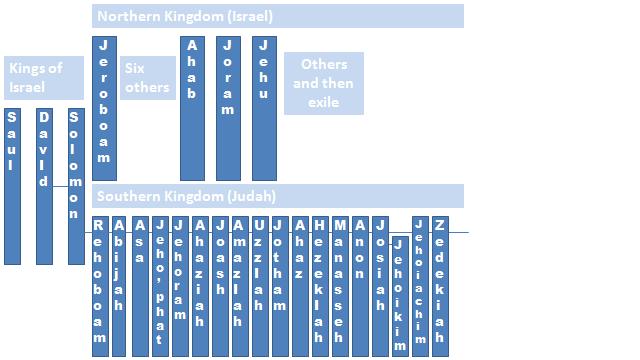
2 Chronicles 34-36
(Exile from Judah)
May 14th
Produced by The Listening for God Ministry
Copyright 2016
Click here for a print- friendly version
Please refer to one or more Bible versions of your choice to read this section. We recommend that you read at least two versions for added understanding. For your convenience, we have provided six links below, each of which takes you directly to today's chapters in a specific version:
Bible Gateway
Key Verse
The Lord, the God of their ancestors, sent word to them through his messengers again and again, because he had pity on his people and on his dwelling place. But they mocked God’s messengers, despised his words and scoffed at his prophets until the wrath of the Lord was aroused against his people and there was no remedy. Summary of Chapters
This set of chapters concludes 2 Chronicles. It begins on a positive note in chapter 24, as Josiah, son of Anon removed all of the symbols of idol worship. The temple had fallen into disrepair during the two generations after Hezekiah. Therefore, Josiah had the temple restored, during which the book of the law was re-discovered. Josiah was on the right spiritual path, but there was a consequence in the works for the collective disobedience over many generations. The prophetess Hilkiah foretold the impending disaster of exile to Babylon, but said Josiah will be spared because he humbled himself before the LORD.
Chapter 36 summarizes the next several rulers. Three evil kings followed Josiah (Jehoikim, Jehoioachim, and Zedekiah) and then God allowed Judah to be taken captive and exiled by the Babylonians, who also destroyed the temple.
“This is what Cyrus king of Persia says: Reflection and Application
Up to this point, everything in 1 Chronicles and 2 Chronicles was a review of the events that took place in 1 Kings and 2 Kings. In some cases selected details were excluded, in other cases new information was added from other sources. The net effect was a different perspective, with the focus on information needed to inspire the people to rebuild the temple and their nation.
Questions and Prayers for Further Reflection
Looking Ahead
Tomorrow's reading: Overview of Ezra and a study of Ezra (1-4) (Return from Exile)
2 Chronicles 34-36 (King James Version - KJV)
2 Chronicles 34-36 (New Revised Standard Version - NRSV)
2 Chronicles 34-36 (New International Version - NIV)
2 Chronicles 34-36 (The Message - MSG)
US Conference of Catholic Bishops
2 Chronicles 34 (New American Bible - NAB) (click next chapter for chapters 35-36)
British Bible Society
2 Chronicles 34(Good News Bible - GNB) (click next for chapters 35-36)
- 2 Chronicles 36:15-16 (NIV)
Chapter 35 records that Josiah reinstated the Passover celebration with large quantities of sacrifice and celebrated the Feast of Unleavened Bread for seven days. The author wrote that there had not been a celebration like this since Samuel’s days, so apparently it was even greater than the one held by Hezekiah.
Josiah died unnecessarily fighting Neco, king of Egypt – even though the Neco was just passing through on his way to battle Assyria. Moreover, the LORD had warned Josiah, through Neco, not to engage him in battle. He was the last good king.

The book concludes by observing that after 70 years of exile, Cyrus, king of Persia, declared that God called him to rebuild the temple and he allowed the surviving remnant to return.
In the first year of Cyrus king of Persia, in order to fulfill the word of the LORD spoken by Jeremiah, the LORD moved the heart of Cyrus king of Persia to make a proclamation throughout his realm and also to put it in writing:
“‘The LORD, the God of heaven, has given me all the kingdoms of the earth and he has appointed me to build a temple for him at Jerusalem in Judah. Any of his people among you may go up, and may the LORD their God be with them.’”
- 2 Chronicles 36:22-23 (NIV)
In the last section of the last chapter of 2 Chronicles the author adds a concluding statement that occurred after the time of 2 Kings. He summarizes the return of the remnant of people from Judah and Israel – 70 years after the exile of the Judeans. The use of the number seven in the Bible often represents a state of completeness, as in the six days to create the world and a seventh day to rest, and six days in the week with a seventh day to rest. Seventy years of exile allowed for ten of the seven-year cycles that the LORD had commanded. The Israelites were supposed to leave the land fallow every seventh year, but they had forgotten about this law, so the LORD allowed the land to cleanse itself during this 70 year period.
Josiah and his officials re-discovered the lost book of the law. This may have been the only copy or one of a very few, so it was an important discovery. In our era, there are millions of copies of God’s word in the Bible, so one lost copy is not necessarily a disaster for the community at large. However, when the community has copies that sit on the shelf and are never read, or when there are websites that are never used, then we are no better off than a situation in which our only copies have been lost. True, we can open the book or web site at any time, but if we don’t then we are lost and in our own private exile. If we want to know what God wants for us and the direction that he wants us to take then we need to open the Bible, read it, and study it, as you are doing now.
What one word stands out in your mind when you reflect upon what we have read in 2 Chronicles? What are the other words that you remember seeing frequently? Take a look at an artists depiction of the relative frequency of each word from 2 Chronicles, as illustrated in a word cloud on the 66 Clouds website: 2 Chronicles Word Cloud
Related Questions
Recommended Prayer
Father in heaven, we acknowledge the value of your word. Please help us to find time to study it.
Suggested Prayer Concerns
Librarians and Web Designers
Comments and Questions
If you have comments or questions, please add them to our Comments page, email to the author at
ted@listeningforGod.org,
or share your comments or questions via the Listening for God Twitter account